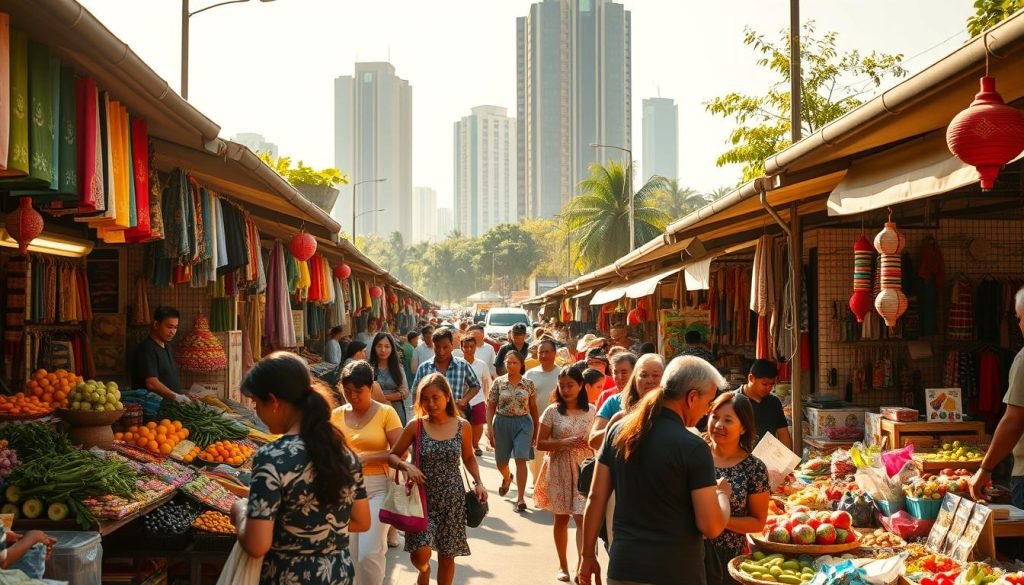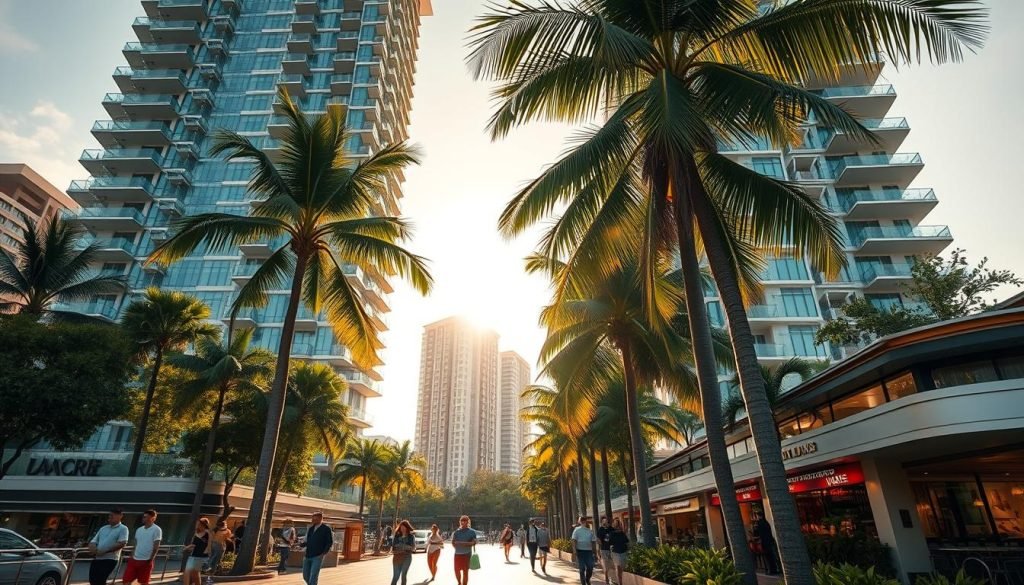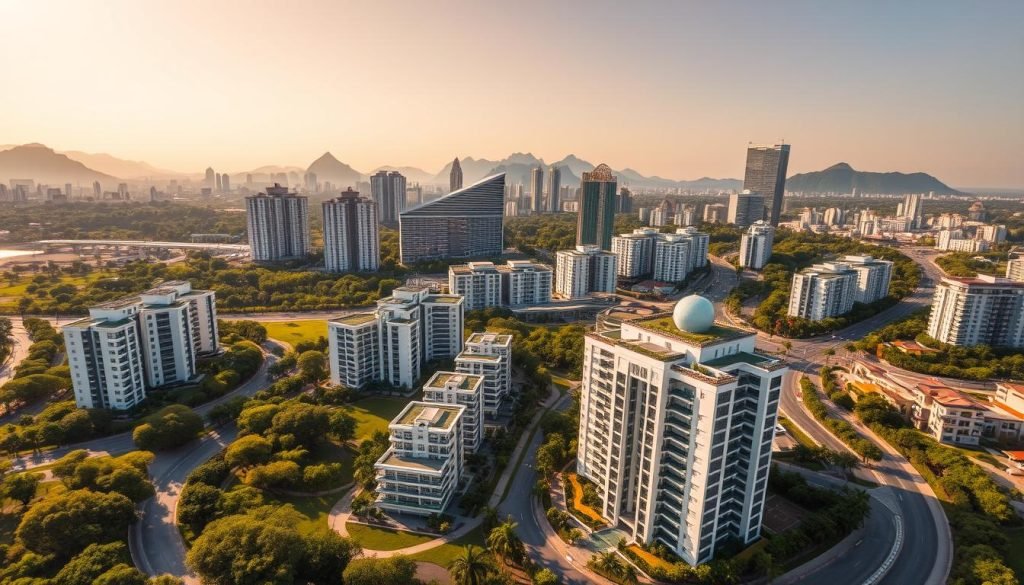Vietnam Real Estate Market Trends in 2025

When looking into investment opportunities in Southeast Asia, Vietnam’s emerging market catches your eye. It’s known for its robust economic growth and a lot of foreign direct investment (FDI).
The country’s maturing regulatory environment makes it even more attractive to investors. With a solid economic base, Vietnam is set to keep growing. This makes its real estate sector a great choice for investors.
The market will be fueled by ongoing infrastructure projects. There’s also a growing need for both commercial and residential properties.
Key Takeaways
- Vietnam’s economy is experiencing robust growth, attracting foreign investment.
- A maturing regulatory environment enhances market attractiveness.
- Ongoing infrastructure developments drive demand for properties.
- The real estate sector is poised for continued growth.
- Investors are drawn to Vietnam’s strong economic foundation.
Current State of Vietnam’s Real Estate Market
The real estate market in Vietnam is growing fast. This growth comes from more demand and higher property prices.
Key Market Indicators and Statistics
In Hanoi, apartment prices have jumped by 22.3% in a year. Now, they cost $2,547 per square meter. This shows the market is on the rise.
| City | Price per Square Meter | Year-on-Year Change |
|---|---|---|
| Hanoi | $2,547 | 22.3% |
| Ho Chi Minh City | $2,100 | 18.5% |
Most Active Property Sectors
The residential sector, like apartments in big cities, is very active. This is because of more people moving to cities and a growing middle class.
Regional Performance Differences
Hanoi and Ho Chi Minh City are leading the growth. But other areas are also developing, just at a slower rate.
Vietnam Real Estate Trends to Watch in 2025
Vietnam’s real estate market in 2025 will be shaped by several trends. The market has grown a lot, with property prices rising by 59% in 5 years. This growth is due to a lack of supply and more foreign investment.
Emerging Hotspots in Ho Chi Minh City and Hanoi
Ho Chi Minh City and Hanoi are growing fast. New areas are attracting investors. In Ho Chi Minh City, Thu Thiem and District 2 are booming. In Hanoi, Dong Anh and Soc Son are becoming hot spots.
Coastal Development Opportunities
Coastal areas in Vietnam are becoming popular for tourism and real estate. Da Nang, Nha Trang, and Phu Quoc are seeing more projects. They are great for investors looking at coastal areas.
Price Forecast by Property Type
Prices for different properties will change based on demand and supply.
Residential Condominiums
Residential condos in big cities will likely see higher prices. Look for projects with good connections and amenities.
Commercial Properties
Commercial properties, like those in CBDs, will benefit from more FDI and local growth. Rental yields will stay attractive, mainly in top office spaces.
Land Investments
Investing in land is a long-term strategy. It has the chance to increase in value a lot.
“Land is a finite resource, and its value tends to increase over time, specially in areas earmarked for infrastructure development.”

Navigating Regulatory Changes as a US Investor
Investing in Vietnam’s real estate market in 2025 is a big step. You need to know the rules well. The Vietnamese government has made big changes, like the 2024 Land and Housing Laws. These laws make the market clearer and more welcoming to investors.
Updated Foreign Ownership Laws for 2025
New rules have made it easier for foreign investors. Now, you can own 100% of apartment projects and 50% of residential areas. This is great news for US investors, giving them bigger roles in Vietnam’s real estate.
Tax Implications and Double Taxation Agreements
Vietnam has agreements with countries like the US to avoid double taxation. US investors should know about the corporate income tax rates. These range from 10% to 20%, based on the investment and where it is. Knowing this helps make your investment more profitable.
Required Documentation and Legal Procedures
To invest in Vietnam, you must follow certain steps. You need a valid visa and to register with local authorities. You also need the right permits. Working with good local lawyers and consultants can help you meet these requirements.
How to Build Your Vietnam Investment Strategy
Foreign direct investment in Vietnam’s real estate hit $6.3 billion in 2024. This makes the market perfect for smart investments. It’s key to create a strategy that fits your financial goals and how much risk you can take.
Entry-Level Investment Approaches ($50,000-$200,000)
For new investors, Vietnam has many affordable choices. You might want to look at apartments or condos in places like Da Nang or Nha Trang. These cost between $50,000 and $200,000 and can give you steady rental income.
Mid-Range Opportunities ($200,000-$500,000)
Investing in the mid-range can bring better returns. Think about villas or townhouses in spots like Hoi An or Phu Quoc. These usually cost between $200,000 and $500,000.

Luxury Market Positioning ($500,000+)
For those with a lot of money, Vietnam’s luxury real estate is worth a look. You could buy high-end villas or apartments in fancy areas like District 2 in Ho Chi Minh City or Tay Ho in Hanoi.
Rental Yield Expectations by Property Type
| Property Type | Rental Yield |
|---|---|
| Apartment | 4-6% |
| Villa/Townhouse | 5-8% |
| Luxury Apartment/Villa | 6-10% |
Knowing the rental yield for different properties helps you choose wisely in Vietnam’s real estate market.
Step-by-Step Guide to Purchasing Vietnamese Property
Vietnam’s economy is growing fast, making it a great place for property investors. Knowing how to buy property here is key.
Finding Legitimate Properties and Developers
First, find good developers and properties. Look for places near big projects, like Hanoi’s metro. These areas can be 15-25% more expensive than others.
Working with Reputable Local Agents
Working with a good local agent helps a lot. They know the market well and can guide you through laws.
Due Diligence Checklist for Foreign Buyers
Doing your homework is very important. This includes:
- Checking the property title
- Inspecting the property
- Looking over all contracts
Title Verification Process
Make sure the property title is clear. There should be no disputes or debts.
Property Inspection Guidelines
Look for any damage or repairs needed. A professional inspector can give you a detailed report.
| Due Diligence Aspect | Description | Importance Level |
|---|---|---|
| Title Verification | Ensuring the seller has the right to sell | High |
| Property Inspection | Checking for damages or needed repairs | High |
| Contract Review | Understanding all terms and conditions | High |
Closing the Deal Securely
After checking everything, work with your agent and lawyer. This ensures the deal is safe and follows Vietnamese laws.
By following these steps, you can buy property in Vietnam with confidence. This way, you can take advantage of the country’s promising real estate market.
Managing Risks in the Vietnamese Market
When you think about investing in Vietnam’s real estate, knowing the risks is key. The Vietnamese government has put in place rules like taxes on very expensive properties. This is to stop people from buying just to hold onto it.
Common Pitfalls for US Investors
US investors need to watch out for a few big risks. These include market volatility and regulatory changes. Knowing about these can help you make better choices.
Currency Exchange Risk Mitigation
To lessen the risk of currency changes, think about using financial instruments. Tools like forward contracts or options can shield your investment from big currency swings.
Creating Effective Exit Strategies
Having a solid exit plan is essential. You might plan for rental income or capital appreciation. This way, you can sell your assets when you need to.
Insurance and Property Management Considerations
Investors should look into insurance and property management. These can protect your assets and keep them in good shape. They also help keep your investment’s value up and provide a steady income.
By knowing these risks and finding ways to deal with them, you can do well in Vietnam’s real estate market. You’ll be able to make smart investment choices.
Vietnam’s Real Estate Market Outlook
Thinking about investing in Vietnam’s real estate? It’s key to know the current trends and what’s coming next. The market is set to grow by 10-15% each year until 2026. This growth comes from new hotspots in big cities and coastal areas.
There’s a move towards greener and more luxurious properties in Ho Chi Minh City and Hanoi. Property prices will likely go up, with different rates for different types and places. Staying updated on the market forecast is vital for smart investing.
Vietnam’s real estate market is attractive for investors because of its growth and variety of opportunities. By grasping the trends, chances, and hurdles, you can successfully invest and reach your goals.
FAQ
What are the key trends shaping Vietnam’s real estate market in 2025?
In 2025, Vietnam’s real estate market will see new hotspots in big cities. Coastal areas will also see growth. Prices will vary by property type, thanks to the country’s economic growth and foreign investment.
How do foreign ownership laws in Vietnam affect US investors?
Vietnam has updated its foreign ownership laws. US investors need to know about these changes. This includes how much foreign ownership is allowed in different properties and the legal steps needed.
What are the most active property sectors in Vietnam’s real estate market?
The most active sectors in Vietnam’s real estate market are residential, commercial, and industrial properties. Different regions, like Hanoi and Ho Chi Minh City, have varying levels of activity.
What are the regional performance differences in Vietnam’s real estate market?
Vietnam’s real estate market varies by region. Economic growth, infrastructure, and tourism play big roles. Major cities like Hanoi and Ho Chi Minh City are driving growth. Coastal areas offer development opportunities.
How can US investors mitigate currency exchange risks in Vietnam’s real estate market?
US investors can reduce currency exchange risks in Vietnam. They can use hedging strategies like forward contracts or options. They should also think about how exchange rate changes might affect their returns.
What are the rental yield expectations for different property types in Vietnam?
Rental yields in Vietnam vary by property type. Apartments in big cities like Hanoi and Ho Chi Minh City offer high yields. Villas and commercial properties may have lower yields, depending on location and management.
What are the common pitfalls for US investors in Vietnam’s real estate market?
US investors in Vietnam should avoid common pitfalls. These include not doing enough research, underestimating local market knowledge, and ignoring regulatory changes and currency risks.
How can US investors create effective exit strategies for their Vietnamese properties?
US investors can plan effective exits for their Vietnamese properties. They should consider market conditions, property type, and location. They should also think about their exit options, like selling or renting out.
What are the tax implications for US investors in Vietnam’s real estate market?
US investors in Vietnam face tax implications. These include income tax on rental income and capital gains tax on sales. Double taxation is possible but can be reduced by using double taxation agreements between the US and Vietnam.



